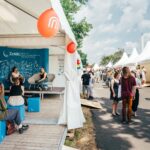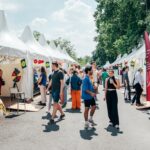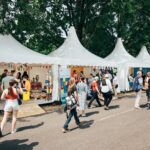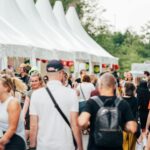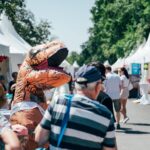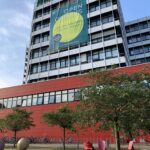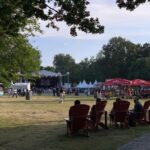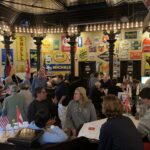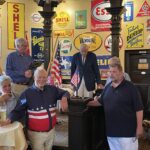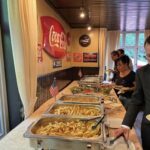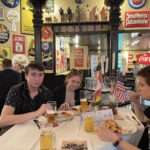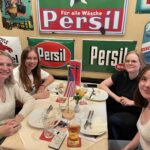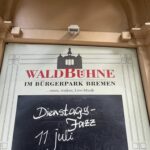This year’s OPEN CAMPUS was a blast. Inspired by the motto “Open worlds – share knowledge” around 20.000 guests were not only able to learn more about the Uni itself and its institutes through lectures and guided tours, but also enjoy some great music in a festival-like setting in the evening. We’re already excited for the next year!
Independence Day Dinner 2023
We hope you had a great Independence Day! Here are some moments we captured at the Independence Day Dinner organised by the Carl Schurz Deutsch-Amerikanischer Club e.V. at the Restaurant “Waldbühne”.
New Scholarship Flyer for the Spring Semester 2024!
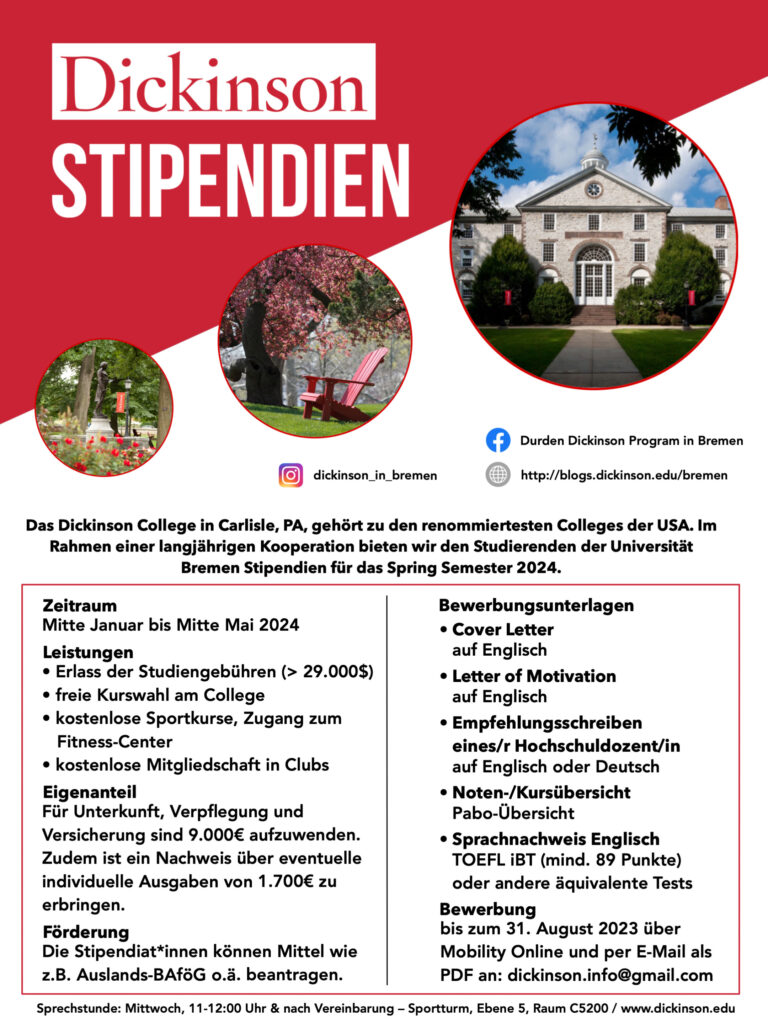
Attention Bremen students! Our new scholarship flyer for the spring semester 2024 has arrived 👀
You can find all necessary information about our scholarship program between the University of Bremen and Dickinson College on the flyer. We are looking forward to your application! 🤓
Should you like to have more information, you can come visit us during our office hours on Wednesdays, 11 – 12 (Uni Bremen Sportturm, C5200) or schedule an appointment with us.
Romano De Caprio’s Internship („Praktikum“) in Rhineland-Palatinate
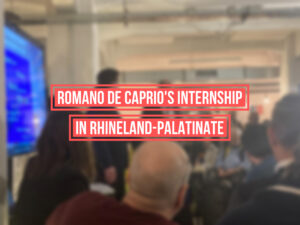
by Romano De Caprio ’24
Gerd Schreiner is a local politician for Rhineland-Palatinate, and he is currently fighting to make big changes. Throughout the month of March, he was gracious enough to let me experience the beauty of German local politics.
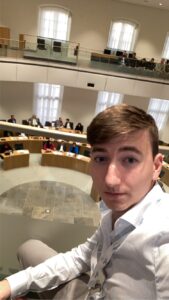 Mr. Schreiner is a member of the “Christlich Demokratische Union Deutschlands“ (CDU) in Rhineland-Palatinate, which is a successful Christian-democratic, conservative, and economically liberal party in Germany. He is the head of the ‘Klimaschutzpolitik’ for his faction, which means he has input in every form of climate protection-based policy in Rhineland-Palatinate. When I first arrived in Mainz at the end of March, I had no idea what to expect. All that I wanted to get out of this internship was to be able to see how the inner workings of German politics function. It did not take long for me to see Mr. Schreiner meet with numerous Mainz Citizens daily and work with them to better his beautiful city. On the very first night of my internship, Mr. Schreiner said to me “Come to my event tonight, it will give you a true insight into the way politics work here.”
Mr. Schreiner is a member of the “Christlich Demokratische Union Deutschlands“ (CDU) in Rhineland-Palatinate, which is a successful Christian-democratic, conservative, and economically liberal party in Germany. He is the head of the ‘Klimaschutzpolitik’ for his faction, which means he has input in every form of climate protection-based policy in Rhineland-Palatinate. When I first arrived in Mainz at the end of March, I had no idea what to expect. All that I wanted to get out of this internship was to be able to see how the inner workings of German politics function. It did not take long for me to see Mr. Schreiner meet with numerous Mainz Citizens daily and work with them to better his beautiful city. On the very first night of my internship, Mr. Schreiner said to me “Come to my event tonight, it will give you a true insight into the way politics work here.”
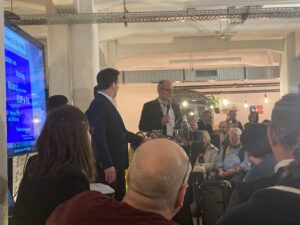 The event was called a podium discussion, which Mr. Schreiner was the moderator of. I was unaware until the beginning of the event that the two men discussing at the podium would be Nino Haase (non-party) and Christian Viering (Die Grünen), the two men running for Mayor and at the time in a run-off race. Although it was apparent that they were competing against each other, their civility and respect for one another were incredible. Even though I might not be German it was evident to me that both candidates had the goal to make Rhineland-Palatinate better for all. The event itself was delightful and truly set the tone for the rest of my time in Mainz. The next day I was able to sit in on the CDU-Fraktion’s group meeting where they discussed what they would say at the next Parliament meeting, and then I was able to witness them in action hours later as the Bundestag met. My everyday life in Mainz was simply enhancing and unimaginable, every day was so different from the last.
The event was called a podium discussion, which Mr. Schreiner was the moderator of. I was unaware until the beginning of the event that the two men discussing at the podium would be Nino Haase (non-party) and Christian Viering (Die Grünen), the two men running for Mayor and at the time in a run-off race. Although it was apparent that they were competing against each other, their civility and respect for one another were incredible. Even though I might not be German it was evident to me that both candidates had the goal to make Rhineland-Palatinate better for all. The event itself was delightful and truly set the tone for the rest of my time in Mainz. The next day I was able to sit in on the CDU-Fraktion’s group meeting where they discussed what they would say at the next Parliament meeting, and then I was able to witness them in action hours later as the Bundestag met. My everyday life in Mainz was simply enhancing and unimaginable, every day was so different from the last.
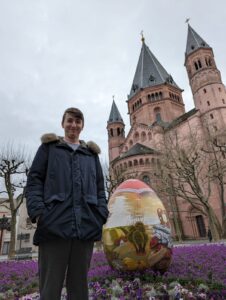 One day Mr. Schreiner took me to the city of Sinzig to meet with businessmen and discuss how to avoid another possible flood. After that meeting, Mr. Schreiner drove me around the town so that I could see the impacts of the last flood and he informed me of all the tragedies that occurred in a certain area. The next day we met with two architects from Berlin and Mr. Schreiner gave them a private tour of Dom St. Johannis, the older delicate Cathedral in Mainz. I was very lucky to see the insides of this beautiful historic Cathedral for myself, and I could not believe how spooky the hidden crypt aspect was.
One day Mr. Schreiner took me to the city of Sinzig to meet with businessmen and discuss how to avoid another possible flood. After that meeting, Mr. Schreiner drove me around the town so that I could see the impacts of the last flood and he informed me of all the tragedies that occurred in a certain area. The next day we met with two architects from Berlin and Mr. Schreiner gave them a private tour of Dom St. Johannis, the older delicate Cathedral in Mainz. I was very lucky to see the insides of this beautiful historic Cathedral for myself, and I could not believe how spooky the hidden crypt aspect was.
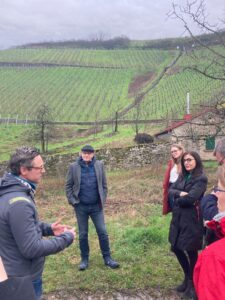 However, my absolute favorite experience of my internship did not even take place in Mainz. On a Friday in late March, Mr. Schreiner, his team, and I drove to a town called Würzburg in Bavaria. There we learned about the new innovative ways that people are becoming more carbon-friendly and what adaptations ‘Wine Mountains’ have made in the past few years. Both topics were insightful to learn about and everyone was extremely nice. It was tricky to understand the Germans from Bavaria because they have a very unique dialect, but I had an amazing time.
However, my absolute favorite experience of my internship did not even take place in Mainz. On a Friday in late March, Mr. Schreiner, his team, and I drove to a town called Würzburg in Bavaria. There we learned about the new innovative ways that people are becoming more carbon-friendly and what adaptations ‘Wine Mountains’ have made in the past few years. Both topics were insightful to learn about and everyone was extremely nice. It was tricky to understand the Germans from Bavaria because they have a very unique dialect, but I had an amazing time.
Overall, working for Mr. Schreiner was simply a pleasure, I was genuinely excited to go to his office every day. I did not have the most rigorous amount of daily work as my big project was to write an article on the differences in carbon neutrality in sports stadiums between the US and Germany, that will appear in a book published by Mr. Schreiner. This article took up the majority of my time in Mainz, and along the journey of writing it, Mr. Schreiner was extremely kind in helping me. He taught me a lot about the German grammar errors I was making but more importantly, this project taught me how to take it upon myself to research a topic and gain expertise on it all on my own. I am very grateful Mr. Schreiner took me on to be his “Praktikant” and it has been a memory of a lifetime for me!
Impressions and favorite sights from this year’s Berlin excursion
An insight into German politics, a lot of exciting sights and of course loads of Currywurst. Our spring students share their most liked moments from the trip to the capital of Germany.
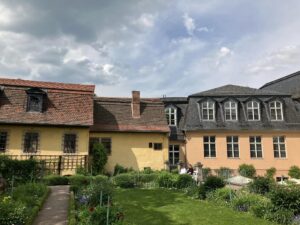
“Weimar is a small city in the heart of Germany, but it has a deep history and culture tied to it. The city is surrounded by nature, and it has a plethora of statues and historical buildings dotted throughout the streets. My favorite place in Weimar was Goethe’s house. It was interesting to peer into the private life of such a prolific writer.” – Sean Moore ’24
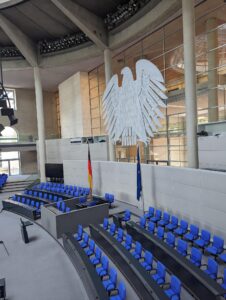
“I really enjoyed visiting the Bundestag. It was really cool to get the experience to sit in the parliament and learn so much about the way meetings are conducted there. Getting to also explore the dome above was really nice, the view from there of the city was really beautiful.” – Vasilisa Pallis ’24
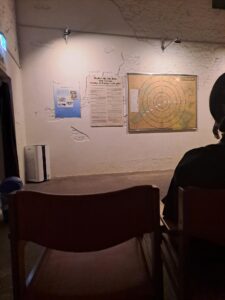
“Besides getting to eat Currywurst nearly everyday, a highlight from the Berlin trip was the underground Bunker tour. It was both interesting and eerie seeing how the subway infrastructure was planned to be used for protection in the case of a nuclear attack and really underscored the tension present in Berlin during the Cold War.” – Benjamin Wiggins ’24
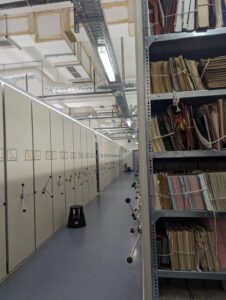
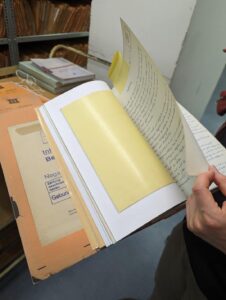
“My favorite part of the trip was visiting the Stasi Museum. It was very cool to see the espionage acts committed by the Stasi and seeing how miserable life was in the GDR was very enlightening. Our tour guide was very kind and knowledgeable and I am thankful to have seen the archives at the museum.” – Romano De Caprio ’24
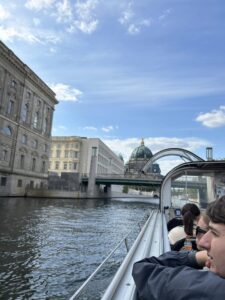
“My favorite activity in Berlin was the boat tour. The weather and the water were beautiful and relaxing that day. It was great that we could see a bunch of important things all in a one-hour tour. The tour guide was also very nice and funny.” – Asher Reede ’24
“My Reflections on Interning in Bremen”
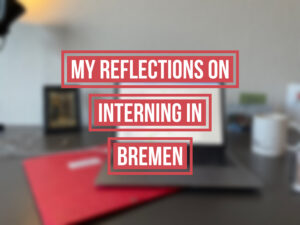
by Benjamin Wiggins ’24
Coming to Bremen, I wanted to find a way to both gain more professional experience and practice my German in a more formal, businesslike setting. Thus, it was great having the opportunity to intern with Mr. Drechsel, who operates both his own brand consultancy, BrandMerchand, and is the country manager of the DACH region (Germany, Austria, Switzerland) for an English brand valuation consultancy named Brand Finance. The latter releases annual reports ranking the most valuable brands across different business sectors and countries. As part of my internship, I gained valuable experience translating report pages and advertisements into German, researching various business trends in the German economy affecting brands in multiple sectors, and always remembering to speak in the “Sie” case – a skill acquired both slowly and imperfectly.
As I started my internship, Brand Finance had just released an assessment of how sustainable fans and stakeholders perceive European soccer clubs to be–something German clubs are very focused upon. A project I worked on over the weeks with Mr. Drechsel was identifying different points of contact at each of the clubs in the 1. and 2. Bundesliga, Germany’s professional soccer divisions, while also noting a few of their sustainability projects and initiatives. It was interesting seeing the different aspects of Sustainability as denoted by ESG (Environmental, Social, Governance) each club focused upon–some clubs were very environmentally focused while others had primarily social initiatives–while also learning about how the clubs, or Sportvereine, are structured as both professional corporations and historic sports associations. For example, one club, Borussia Dortmund, still has stocks that trade on an exchange. After collecting all the information, it was time to write email proposals to 12 teams who would likely be interested in the report. Writing business proposals was certainly not something I practiced in my previous courses, so I was pretty nervous beforehand. However, in the end, after countless rereads, corrections, and input from Mr. Drechsel, I was able to send out 15 targeted emails and even receive some responses.
Doing an internship in Bremen is something I recommend to everyone as it allows you to practice speaking and writing styles not often taught in the classroom. As I jokingly told my parents when they asked how it was going, I can talk about a poem in German, but giving Excel directions must be a C1-level skill. If you are interested in an internship, do not think that a few false conjugations while speaking or forgetting a word now and again disqualifies you from one. I certainly made many speaking errors, but I got to work with a supportive boss who gave feedback and corrections to support my language learning. Lastly, be open to everything. The research and writing I got to do for this internship were all really interesting and, as I look to pursue a Master’s in Accounting, connected well to my overall career goals.
Renewal of the cooperation between Dickinson College and the University of Bremen
In April 2023, the Durden Dickinson Bremen Program welcomed a special guest from Carlisle in order to renew the long-standing cooperation between Dickinson College and the University of Bremen.
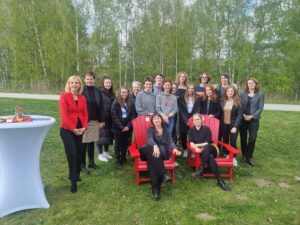
The Associate Provost and Executive Director of the Center for Global Study and Engagement (CGSE), Samantha Brandauer, came to Bremen for a few days on behalf of Dickinson College in order to renew the cooperation with the University of Bremen. This collaboration has existed since 1984/85 and has resulted in a successful Study Abroad Program. As a symbol of the two institutions’ ongoing friendship many red Adirondack chairs of the same kind as on Dickinson’s campus have been placed on the meadows of the University of Bremen over the past years.
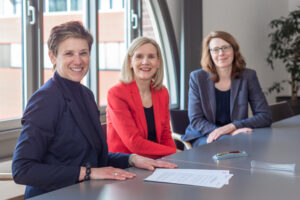
On April 27, the new contract between the two institutions was signed by the President Prof. Dr. Jutta Günther, in the presence of Vice President Dr. Mandy Boehnke and Samantha Brandauer, pledging that both institutions intend to continue their partnership for the next decades.
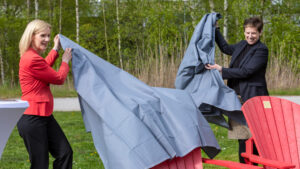 To mark the occasion, the last two red “Dickinson chairs“ were unveiled during a ceremony by Samantha Brandauer and Prof. Dr. Jutta Günther. They serve as a representation of the past decades and represent the German-American exchange.
To mark the occasion, the last two red “Dickinson chairs“ were unveiled during a ceremony by Samantha Brandauer and Prof. Dr. Jutta Günther. They serve as a representation of the past decades and represent the German-American exchange.
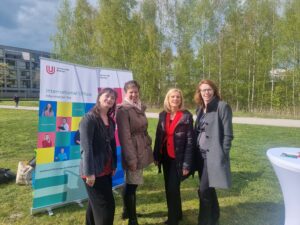
The ceremony was also attended by Dr. Janine Ludwig, the Academic Director of the Durden Dickinson Bremen Program, Dr. Mandy Boehnke and Dickinson students currently studying in Bremen, along with former exchange students, as well as former and future Overseas-Student-Assistants (OSAs).
https://blogs.dickinson.edu/bremen/2015/06/08/dickinson-in-germany-turns-30/
Photos by Matej Meza and Silke Prangemeier.
Renewal of the cooperation between Dickinson College and the University of Bremen
Hello there! We’ve got some exciting news that we want to share with you: Last Thursday, April 27, a renewal of the cooperation between Dickinson College and the University of Bremen took place. After the signing of the contract, two new red Adirondacks, or Dickinson chairs as they are called in Bremen, were unveiled in a festive ceremony by Prof. Dr. Jutta Günther (President of the University of Bremen) and Samantha Brandauer (Associate Provost & Executive Director of CGSE at Dickinson). Furthermore, Dr. Mandy Boehnke (Vice President of the University of Bremen) and Dr. Janine Ludwig (Academic Director of the DiB Program), as well as some of our former and future OSAs/exchange students joined the event. We would like to thank everyone who was involved in the planning and implementation of this special day. We are looking forward to a great collaboration in the years to come!
DiB Vienna Excursion 2023
Have a look at some impressions of this year’s DiB excursion to the wonderul city of Vienna!
Music by Bensound.com/royalty-free-music

